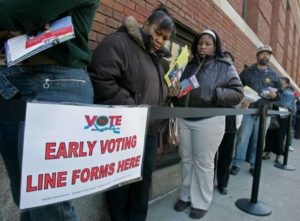
Voters line up outside the Hamilton County Board of Elections for early voting in Cincinnati, October 2008. FILE photo.
A federal judge struck down an Ohio voting law Tuesday that cut in-person early voting on Sundays and weekday evenings.
U.S. District Judge Michael Watson ruled the law was in violation of the Voting Rights Act by discriminating against African-Americans, who traditionally head to the polls during these times.
State Republicans introduced legislation in 2014 that also eliminated Golden Week, a seven-day period that allowed residents to register to vote and cast an absentee ballot at the same time. Democrats charged the law suppressed votes by left-leaning groups, including minorities and students.
In his 120-page opinion, Watson noted more than 60,000 Ohioans voted during Golden week in 2008. The number rose to over 80,000 in 2012. Black voters casted ballots 3.5 times the rate of whites in 2008 and 5 times as often in 2012.
“Based on this evidence, it is reasonable to conclude that the reduction in overall time to vote will burden the right to vote of African Americans, who use (early in-person) voting significantly more than other voters,” he wrote.
Politifact reported Black voters in Cuyahoga County made up 56 percent of all weekend voters in 2008. Ohio’s biggest county reported the largest percentage of voters that year.
Golden Week was introduced in response to a disastrous 2004 election, which left many residents in majority-Black precincts standing in line for several hours. Investigations found that county election boards had reduced the number of voting machines in certain urban areas.
Researchers have found that voter wait times have become increasingly divided along racial lines in recent presidential elections.
The New York-based Brennan Center for Justice analyzed precinct data from states where voters faced the longest wait times in 2012: Florida, Maryland and South Carolina.
Precincts with high Black populations had longer wait times.
In South Carolina, for example, the 10 precincts with the longest waits had more than twice the percentage of Black registered voters (64 percent) than the statewide average (27 percent).
Additionally, precincts with higher percentages of Black and Latino voters had fewer voting machines.
A Caltech/MIT study found that nationally, African Americans waited nearly twice as long as whites to vote in 2012 (23 minutes for Blacks, 12 for whites)
The Buckeye State is widely considered the most pivotal swing state in presidential elections as the winner of this state has gone on to win every national election since 1960.
State Democrats were quick to praise Judge Watson’s decision, the Columbus-Dispatch reports.
“I am pleased that the federal court has affirmed what we knew all along,” said Alicia Reece, Cincinnati state representative and president of the Ohio Legislative Black Caucus, “that the elimination of the same day voter registration was an unconstitutional restriction on our most basic democratic right that disproportionately affected minority voters in Ohio.”
“It’s a shame that once again our legislature, governor, attorney general and secretary of state cannot figure out how to abide by the constitutional rights of their own voters,” State Democratic Chairman David Pepper said. “The judge found no merit in any of their justifications for the burden they placed on African American voters. How many losses in court, and how many wasted tax dollars, are going to convince them to respect Ohioans’ right to vote?”
Republican Secretary of State John Husted expressed disappointment at the judge’s decision to strike down the portion of the policy affecting Golden Week. Husted previously settled a lawsuit filed by the NAACP and American Civil Liberties Union in April 2015. The agreement upheld the elimination of the same-day voting window.
““This point is further amplified when you consider that, for nearly 200 years, Ohioans voted for only one day. If it was constitutional for lawmakers to expand the voting period to 35 days, it must also be constitutional for the same legislative body to amend the timeframe to 28 days, a timeframe that remains one of the most generous in the nation,” he continued.
A spokesperson for the Attorney General Mike DeWine said the decision would be appealed to the 6th Circuit U.S. Court of Appeals.


